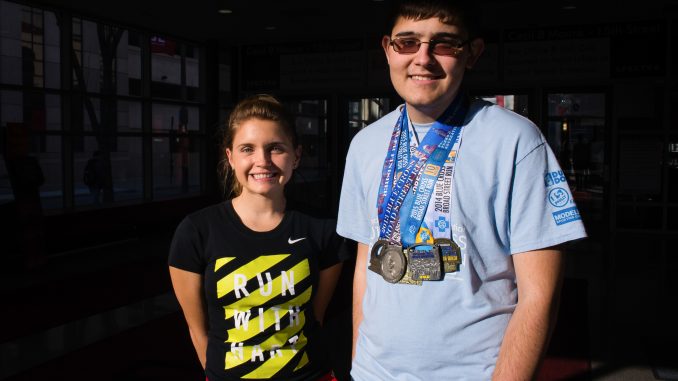
For Dan Varnis, charity races are as beneficial as the causes for which he runs.
Varnis, a junior legal studies major, is one of several students who participates in charity races around Philadelphia. On Nov. 19, Varnis ran the Rothman Institute 8K, a five-mile race beginning at the Benjamin Franklin Parkway and ending at Kelly Drive, for the third time.
“I’m spending all these weeks running and training, and it’s like, ‘I don’t feel like doing this anymore,’” Varnis said. “But then once I’m in the race and I know I’m two miles away from the finish line, it takes on a whole new meaning.”
Varnis said there is an “intrinsic reward that comes along with finishing a race.” That — along with health benefits and the knowledge that his registration fees are helping a nonprofit organization — is why he loves to run charity races.
To prepare for his first charity race, Varnis joined Students Run Philly Style, a program that places students ages 12-18 with volunteer “running leaders.” The running leaders mentor and train students from March to November two or three times per week to prepare for local charity runs.
Varnis has lost 60 pounds since joining the program.
“I [also] found that I was more energetic, I was more personable, I was more eager to go out and do things and my grades definitely were reflected highly of me performing well on the team,” he said.
Megan George, a junior international business major and race director for Temple University Running Club, said running is especially healthy for college students because it helps relieve stress.
George’s first charity run was the Pittsburgh Marathon, which she ran the summer after her freshman year. This year, she ran the Ocean Drive Marathon in Cape May, New Jersey, in March.
George said running 26.2 miles is both physically and mentally demanding.
“When you run a marathon, you go through the biggest mental challenge you could go through,” she said. “Around mile 18 to 22 is when your muscles basically stop working, and it’s really hard to keep moving…but there’s also people around you encouraging you.”
There were more than 20 charity races in Philadelphia in November, including the 23rd annual Philadelphia Marathon on Nov. 20, which boasted 36 charity partners.
Some upcoming races are the Schuylkill River Loop Race on Dec. 4, the Jack Daniels Hot Toddy 5K on Dec. 17 and the Homeless for the Holidays 5K Run/2.5K Walk on Dec. 18.
Runners planning to take part in these races have likely been training for weeks. Varnis suggests beginners train for at least a month to prepare for a 5K run.
No matter the distance, preparing for a charity race takes discipline. George said a full marathon takes about four months of preparation and training.
Ashton Dunkley, a sophomore anthropology and Italian major and a distance runner for the women’s track and field team, said although there is a competitive aspect among serious runners, what has stuck out to her most is the “community aspect” of charity runs.
“Afterwards when [the race organizers] have a barbecue or a picnic where everyone gets together and eats, I think there’s a really good sense of community and everybody gets excited telling you you did a really good job,” she said. “Running is hard work and it’s tough, but the fact that everyone is going through the toughness together inspires a lot of respect for the people around you.”
Dunkley encourages more students to participate in charity runs, even if they aren’t runners, because they have the opportunity to both improve their fitness and help their communities.
“I know a lot of people don’t like running,” she said. “But once you’re in a race with the adrenaline and the momentum and all the excitement of people cheering, that pretty much takes you anywhere else you need to go at that point.”
Alexis Anderson can be reached at alexis.s.anderson@temple.edu.



Be the first to comment